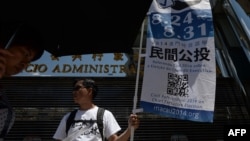While leaders of Hong Kong’s democracy movement are plotting next steps in their push for universal suffrage, many in Macau, Hong Kong’s neighbor, say the Hong Kong protests have fueled a political awakening there.
Macau and Hong Kong are China’s two “special administrative regions” which gives them a measure of autonomy. In Hong Kong, the political arrangement has allowed a vibrant political culture, with pro-democracy political factions and a more free-wheeling independent news media. But nearby Macau remained largely apolitical as it became a global hub for gambling and tourism.
However, that may be changing, as Hong Kong political activists have challenged Beijing to allow direct local elections for the territory’s top political leader.
Emily Lau, chairwoman of Hong Kong’s Democratic Party, spoke about Macau’s parallel calls for open and direct elections of their chief executive.
“Whether we act separately or together I hope the movement for democracy will surge forward, and will not be held back," said Lau.
On August 31 Fernando Chui was re-elected as Macau’s chief executive. He was elected by a 400-person committee that is largely pro-Beijing.
But a referendum held around the same time indicated worrying signs for his public support. Some 89 percent of the nearly 9,000 people in Macau who participated in the referendum said they do not trust him as their leader. Some 95 percent of respondents said they prefer if the territory holds direct elections, in contrast to the system mandated by Beijing, which only allows candidates picked by a panel of largely pro-Beijing loyalists.
Following Macau's referendum, five of its organizers were arrested by Macau police and one was subjected to judicial investigation.
Jorge Godinho, a Visiting Professor at the University of Macau, says the city is undergoing a political awakening. He attributes the discontent to a growing gap between rich and poor.
“Especially for young people, things like the enormous increase in the cost of real estate poses significant barriers to building a normal life did not exist a few years ago. Many say the government has not taken sufficient action to remedy that," said Godinho.
Last spring 20,000 people in Macau publicly protested in favor of democracy and against what they called social injustices created by the gambling industry. Both Hong Kong and Macau are under Chinese rule but maintain separate legal and economic systems. When Britain handed rule of Hong Kong back to China in 1997 the basic law of Hong Kong included that the city’s chief executive would eventually be elected through universal suffrage, and it was later decided that election would take place in 2017. There is no such timeline in Macau, and its constitution makes no mention of universal suffrage.
Simon Young is Associate Dean in the Faculty of Law at the University of Hong Kong and says Macau faces additional hurdles to achieving democracy.
“Even though the basic laws are structured very similarly, there is a lot of commonality, I think we have a very strong tradition of rule of law and an independent judiciary, and Hong Kong has a very strong say on issues of constitutional law. Our political systems are different too. We have a stronger directly elected element in our legislature and that contributes to a stronger voice that our legislatures may have," said Young.
Though he was not directly elected, Macau’s chief executive seems to be heeding the calls of protesters. Chui has said his term in office will prioritize easing Macau’s social disparities and making more affordable housing available.




